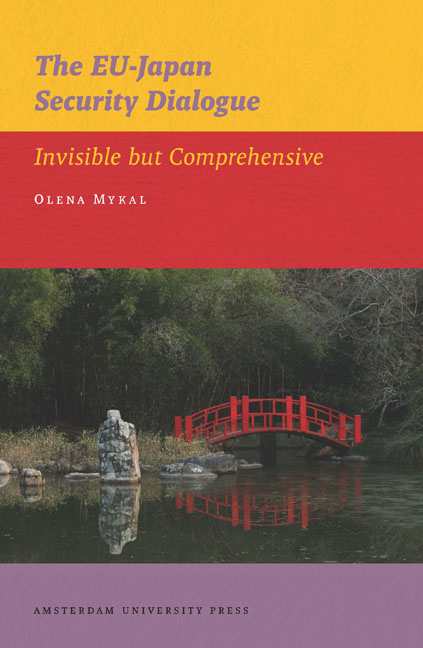Book contents
- Frontmatter
- Dedication
- Contents
- Abbreviations
- Acknowledgements
- Preface
- Introduction
- PART ONE DEVELOPING CONCEPTIONS OF SECURITY AND JOINT AGENDA OF THE EU-JAPAN SECURITY DIALOGUE
- PART TWO COMMON INTERESTS IN THE EU-JAPAN SECURITY DIALOGUE: ANALYSIS OF JOINT ACTIVITIES
- Conclusion
- About the Author
- Notes
- Bibliography
- Index
- Publications Series
- Frontmatter
- Dedication
- Contents
- Abbreviations
- Acknowledgements
- Preface
- Introduction
- PART ONE DEVELOPING CONCEPTIONS OF SECURITY AND JOINT AGENDA OF THE EU-JAPAN SECURITY DIALOGUE
- PART TWO COMMON INTERESTS IN THE EU-JAPAN SECURITY DIALOGUE: ANALYSIS OF JOINT ACTIVITIES
- Conclusion
- About the Author
- Notes
- Bibliography
- Index
- Publications Series
Summary
The Notion of Security and the General Background of the Research
The generally accepted view is that EU-Japanese relations lack a strategic security dimension, especially when compared to the Japanese-US alliance or European-US relations. This seems to be true when one analyses EU-Japanese relations using the traditional Realism interpretation of security. Thus, since the end of World War Two the study of ‘security’ has focused on an examination of the reasons why states use force as an instrument of policy. This meant that interpretations and explanations of the strategic dimension of the US-USSR confrontation dominated security studies of the Cold War era, with all other issues automatically relegated to the status of ‘low’ security issues. However, a broader concept of security started emerging during détente and the Helsinki process in the 1970s. It went beyond traditional military concerns and also included human rights and environmental issues. The Brandt, Palme, and Brundtland Commissions also brought new concepts and interpretations of international problems and their settlement (Thakur, Cooper and English 2005; Independent Commission on International Development Issues (Brandt Commission) 1983; Independent Commission on Security and Disarmament (Palme Commission) 1982; World Commission on Environment and Development (Brundtland Commission) 1987.
Besides this new concept of security, the concept of ‘civilian power’ also arose in Europe in the 1970s and 1980s in recognition of the absence of the European Community in various military affairs due to the failure of the EDC (European Defence Community) in 1954 and NATO's consequent dominance over Western European security, among other factors. Japan, as a consequence of the oil and dollar crises of the 1970s, embarked on a parallel reformulation of its approach to security. The Japanese establishment adopted a broader doctrine of comprehensive security. Therefore, deviations were already occurring during the Cold War period, especially with regards to Japan and the EU, from the traditional view on security.
However, a true ‘parade’ of new security conceptualisations appeared after the end of the Cold War. Thus, in the early- to mid 1990s, the voices of proponents in favour of the concepts of non-traditional, nonstate- centered security and non-military (i.e., non-hard) power became louder. In 1990 Joseph S. Nye, Jr. coined a term ‘soft power,’ which refers to the ability of an international actor to indirectly influence the interests and corresponding behaviour of other actors through cultural and/or ideological means (Nye 1994; 2004).
- Type
- Chapter
- Information
- The EU-Japan Security DialogueInvisible but Comprehensive, pp. 19 - 34Publisher: Amsterdam University PressPrint publication year: 2012



